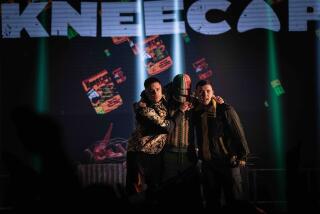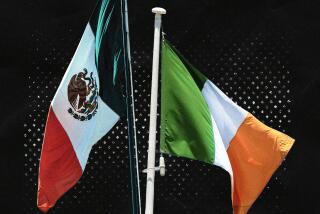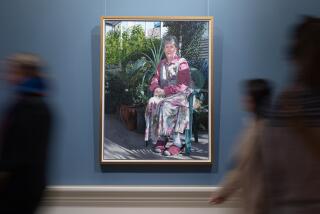Irish Wouldn’t Be Caught Dead in a Coonskin Hat : Politics: Buchanan likes to tout his membership in America’s first ethnic “minority group,” but he’s too inside to be a true son of Ireland.
SAN FRANCISCO — I look at Pat Buchanan and think of the kids I grew up with. When Buchanan laughs--his cheeks balloon with pleasure, his eyes narrow--he reminds me of Tommy Keating, when Tommy laughed at his own dirty joke.
This coming Tuesday, there will be yet another set of primary elections and Patrick J. Buchanan will, with Irish wit, proclaim victory from defeat. But this Tuesday, March 17, is also, and more importantly, St. Patrick’s Day.
I am, I suspect, like many other Catholics in America when I say that some part of my soul belongs forever to Ireland. Our grandparents came to this country from the Azores or from Poland or from Mexico, but our spiritual lives were shaped by the Irish, nuns and priests.
It is no coincidence that my closest friends, from childhood to now, are Irish-Americans--lapsed or not. Keating, Dolan, Lafferty, O’Donald . . . These are the people I whisper to, my intimates, pals, cronies. My lover is Ireland.
Buchanan? I doubt we would have been close friends as boys. Probably we both would have been on the school paper. We would have tolerated one another, even while competing for the role of class wag. But Buchanan strikes me as the kind of guy one wouldn’t enjoy playing basketball with--all elbows and tight smiles.
He also reminds me of somebody’s father. You’d go over to a friend’s house and there would be Dad on the couch, looking like Pat, sounding like Pat, talking about Hitler’s “courage” and the problem of assimilating the “Zulus” into the United States. (In the corner, barely looking up from her sewing, would be the wife, the mother, a worried look on her face.)
The Irish were the first ethnic “minority group” in America. Whatever their differences from other immigrant groups who followed, the Irish must remind other Americans of themselves. The Irish came to America with the long memory of suffering, remembering poverty and political oppression.
There was a fierceness in the Irish girls who were my first teachers. Unsentimental, they were ambitious for my success.
To their fellow Catholics, the Irish offered the example of success in America. But they were, on the one hand, the most Catholic of Catholics. March 17 was their holiday, of course, and it was also ours. There was on TV the spectacle of the parade--Puerto Ricans and Hungarians and Germans--marching up the Avenue of the Rockefellers, under the banner of Ireland.
Who needs bilingual education? The nuns gave me the language that the Brits had shoved down Ireland’s throat. But like Black English, Irish English was inflected with defiance and endurance. And triumph.
You hear it in Buchanan’s language sometimes--the Irish play--his alliteration, the aphorisms, the boast of his tongue, the way he dares English to be rude and strong.
I will be misunderstood by some when I say this: The best thing about Buchanan, the thing I often admire, is his willingness to shoot from the hip. In the crude opinion, there is a candor that in the age of media advisers is not without its charm.
What else does he offer--this man who speaks of “America First?” Many of his fellow journalists assume that he has stolen the thunder from David Duke. And certainly Buchanan’s ascendancy has meant the decline of Duke, at least on the evening news. But Duke was closer to that raw, skinhead and redneck America than Buchanan ever will be.
Buchanan gives voice to a white, middle-class discontent in America. But there is another grievance, deeper. Long after Buchanan will have faded from the scene, Americans will still have to face the white lower-class rage at a government--the liberal agenda of recent decades--that has replaced class with race as the primary determination of social oppression.
Buchanan is an insider. He has worked in the White House, belongs to the media Establishment he otherwise would dearly like to attack. Yes, he toys with nativism, makes remarks that sound anti-Semitic and racist. But as his pals in Washington will tell you, he’s one of the guys--not some redneck good old boy.
I wonder whether he is Irish at all.
There are still plenty of people in this country who use the word Irish to mean lower class, dirty, vulgar. I heard the word used that way, if privately, during the recent William Kennedy Smith rape trial in Florida. What do you expect from the Kennedys--the “Irish” in them, after all--loutish, drunken, smelling of potatoes and cabbage. The British used to say “mere Irish.”
When I think of the Irish, I think of their long memory of suffering. The best that is Irish in the Irish derives from this memory.
An Irish priest who works in Watts tells me that the other day he was talking to some kids when a teen-ager approached. “Why you talkin’ to a white man?” the teen-ager demanded. “He ain’t no white man,” a young voiced piped in response. “He’s Irish.”
Surviving all the rumors about Marilyn Monroe and Mafia molls is something Irish I remember in the Kennedys. I think of Robert F. Kennedy particularly, his rasping, his raw, little voice, speaking of the poor in America. No noblesse oblige about it. Rather, some common bond acknowledged in the voice.
The dark side to the Irish-American story has to do with the slippery ladder. The Irish were afraid of slipping down the ladder, once they started up. There were conflicts with the Italians and with the Jews. There were Irish in California who persecuted the Chinese. And, of course, the Irish are famous for their hostility to blacks.
But I like what Thomas Sowell, the African-American economist, writes: “While the South Boston Irish were rioting over the busing of black schoolchildren into their communities, Catholic parochial schools in cities across the country were operating in black neighborhoods with white--often Irish--priests and nuns, who were achieving remarkable educational results.”
Buchanan was in San Antonio last week, in front of the Alamo, wearing a coonskin hat. He didn’t look very Irish.
In the 1840s, the nativist argument against allowing the Irish into this country was Mexico. The United States was about to go to war with Mexico. Americans worried that the Irish would unite with their fellow Catholics, the Mexicans, and overturn the Protestant state. One hundred and fifty years later, there is this fake Irish-American in his coonskin cap.
There he will be Tuesday--doubtless in a green tie--smiling and declaring victory from defeat. I will be thinking more this St. Patrick’s Day of the Irish girls who traveled across the world to become my teachers. Oh, Ireland, Ireland!
More to Read
Get the L.A. Times Politics newsletter
Deeply reported insights into legislation, politics and policy from Sacramento, Washington and beyond. In your inbox three times per week.
You may occasionally receive promotional content from the Los Angeles Times.










